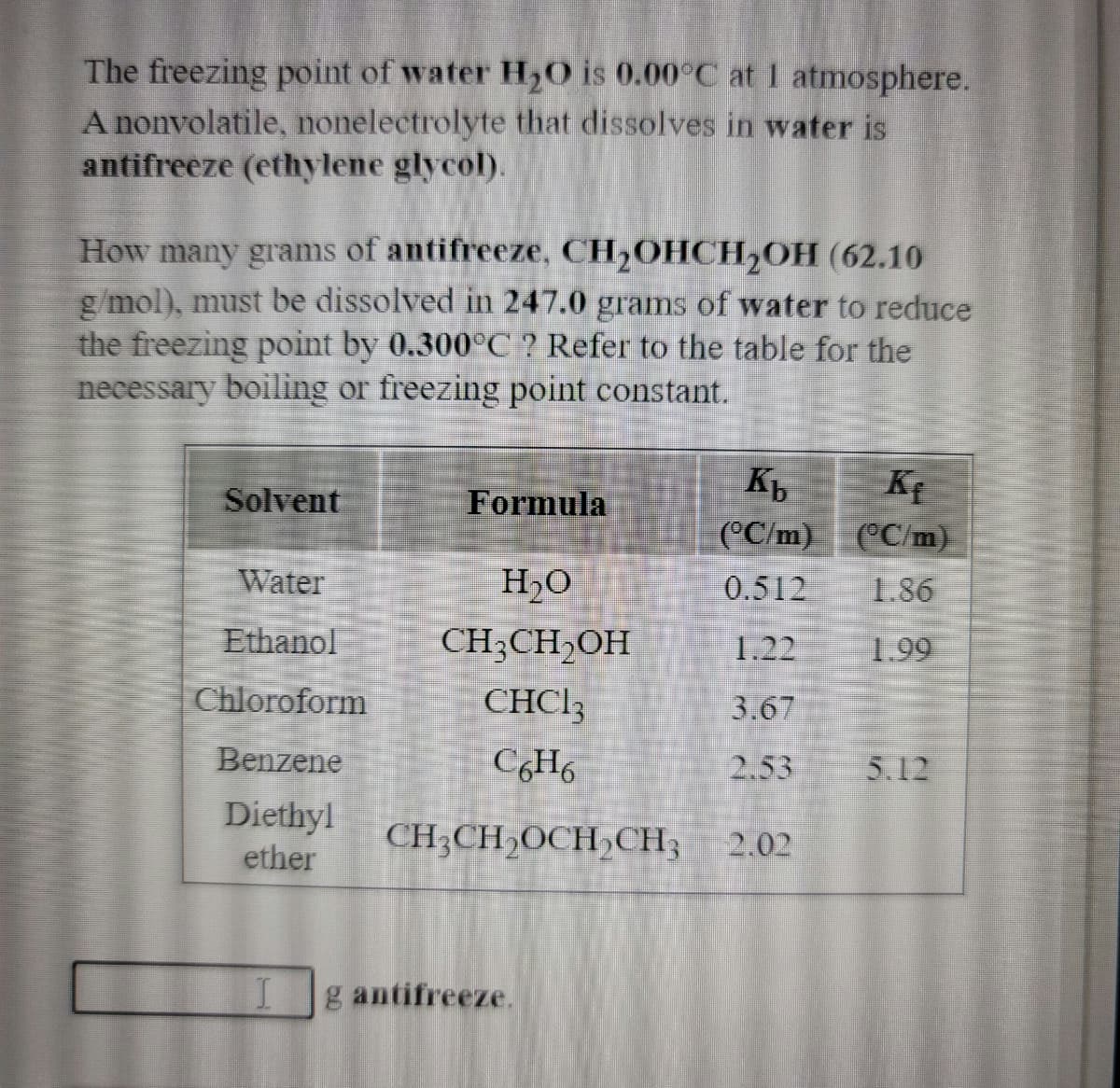The freezing point of water H20 is 0.00°C at 1 atmosphere. A nonvolatile, nonelectrolyte that dissolves in water is antifreeze (ethylene glycol). How many grams of antifreeze, CH,OHCH2OH (62.10 g/mol), must be dissolved in 247.0 grams of water to reduce the freezing point by 0.300°C ? Refer to the table for the necessary boiling or freezing point constant. KĘ (°C/m) (°C/m) Solvent Formula Water H2O 0.512 1.86 Ethanol CH;CH,OH 1.22 1.99 Chloroform CHCI3 3.67 Benzene CgH6 2.53 5.12 Diethyl ether CH3CH,OCH,CH; 2.02 g antifreeze.
The freezing point of water H20 is 0.00°C at 1 atmosphere. A nonvolatile, nonelectrolyte that dissolves in water is antifreeze (ethylene glycol). How many grams of antifreeze, CH,OHCH2OH (62.10 g/mol), must be dissolved in 247.0 grams of water to reduce the freezing point by 0.300°C ? Refer to the table for the necessary boiling or freezing point constant. KĘ (°C/m) (°C/m) Solvent Formula Water H2O 0.512 1.86 Ethanol CH;CH,OH 1.22 1.99 Chloroform CHCI3 3.67 Benzene CgH6 2.53 5.12 Diethyl ether CH3CH,OCH,CH; 2.02 g antifreeze.
Chemistry: An Atoms First Approach
2nd Edition
ISBN:9781305079243
Author:Steven S. Zumdahl, Susan A. Zumdahl
Publisher:Steven S. Zumdahl, Susan A. Zumdahl
Chapter10: Properties Of Solutions
Section: Chapter Questions
Problem 101AE
Related questions
Question

Transcribed Image Text:The freezing point of water H20 is 0.00°C at 1 atmosphere.
A nonvolatile, nonelectrolyte that dissolves in water is
antifreeze (ethylene glycol).
How many grams of antifreeze, CH,OHCH2OH (62.10
g/mol), must be dissolved in 247.0 grams of water to reduce
the freezing point by 0.300°C ? Refer to the table for the
necessary boiling or freezing point constant.
Solvent
Formula
(°C/m)
(°C/m)
Water
H,O
0.512
1.86
Ethanol
CH3CH,OH
1.22
1.99
Chloroform
CHCI3
3.67
Benzene
2.53
5.12
Diethyl
ether
CH;CH2OCH,CH3 2.02
g antifreeze.
Expert Solution
This question has been solved!
Explore an expertly crafted, step-by-step solution for a thorough understanding of key concepts.
This is a popular solution!
Trending now
This is a popular solution!
Step by step
Solved in 2 steps with 2 images

Knowledge Booster
Learn more about
Need a deep-dive on the concept behind this application? Look no further. Learn more about this topic, chemistry and related others by exploring similar questions and additional content below.Recommended textbooks for you

Chemistry: An Atoms First Approach
Chemistry
ISBN:
9781305079243
Author:
Steven S. Zumdahl, Susan A. Zumdahl
Publisher:
Cengage Learning

Introduction to General, Organic and Biochemistry
Chemistry
ISBN:
9781285869759
Author:
Frederick A. Bettelheim, William H. Brown, Mary K. Campbell, Shawn O. Farrell, Omar Torres
Publisher:
Cengage Learning

Chemistry: Matter and Change
Chemistry
ISBN:
9780078746376
Author:
Dinah Zike, Laurel Dingrando, Nicholas Hainen, Cheryl Wistrom
Publisher:
Glencoe/McGraw-Hill School Pub Co

Chemistry: An Atoms First Approach
Chemistry
ISBN:
9781305079243
Author:
Steven S. Zumdahl, Susan A. Zumdahl
Publisher:
Cengage Learning

Introduction to General, Organic and Biochemistry
Chemistry
ISBN:
9781285869759
Author:
Frederick A. Bettelheim, William H. Brown, Mary K. Campbell, Shawn O. Farrell, Omar Torres
Publisher:
Cengage Learning

Chemistry: Matter and Change
Chemistry
ISBN:
9780078746376
Author:
Dinah Zike, Laurel Dingrando, Nicholas Hainen, Cheryl Wistrom
Publisher:
Glencoe/McGraw-Hill School Pub Co

Chemistry: Principles and Reactions
Chemistry
ISBN:
9781305079373
Author:
William L. Masterton, Cecile N. Hurley
Publisher:
Cengage Learning

Chemistry: Principles and Practice
Chemistry
ISBN:
9780534420123
Author:
Daniel L. Reger, Scott R. Goode, David W. Ball, Edward Mercer
Publisher:
Cengage Learning

Chemistry & Chemical Reactivity
Chemistry
ISBN:
9781337399074
Author:
John C. Kotz, Paul M. Treichel, John Townsend, David Treichel
Publisher:
Cengage Learning